Award-Winning Chicago Personal Injury Lawyer - Securing Justice
for Illinois Injury Victims - Over $450 Million Recovered
If you’re a railroad worker injured on the job in the Chicago area, the team at Rosenfeld Injury Lawyers is here to help you seek compensation through the Federal Employers’ Liability Act (FELA). Our dedicated Chicago FELA lawyer team represents injured railroad employees whose injuries were caused by employer negligence, whether in the yard, on a train, or at a job site.
Unlike Illinois workers’ compensation, which provides benefits regardless of fault, FELA claims require workers to prove fault on the part of the railroad company. The benefit is the potential to recover far more than standard workers’ comp, including payment for medical expenses, lost wages, and the full extent of pain, suffering, and disability.
With major railyards like Union Pacific’s Global IV, Metra, and Norfolk Southern operating throughout the region, Chicago railroad workers face daily risks. If you’ve been injured, our law firm can help you pursue maximum compensation.
$7,200,000 Settlement — James, a longtime railyard worker at Norfolk Southern in Chicago, was fatally struck by a contractor’s truck during a shift change. His family pursued a wrongful death claim under FELA, arguing poor traffic control and inadequate lighting. The case settled for $7.2 million before trial.
$2,800,000 Settlement — Carlos worked at Union Pacific’s Global IV yard when a co-worker mishandled a crane, dropping a shipping container on his foot. He suffered multiple fractures and never returned to railroad work. His career-ending injury and evidence of negligence led to a $2.8 million settlement.
$1,900,000 Settlement — Derrick, a Metra mechanic in Chicago, developed chronic shoulder and back problems from years of overhead lifting. His FELA claim focused on the company’s failure to provide proper tools or training. The railroad settled for $1.9 million just before jury selection.
$1,500,000 Settlement — Brian, a train operator for Metra, fell from a slick, unmaintained platform while stepping off his train during a routine stop. He tore his rotator cuff and required multiple surgeries, leaving him unable to return to work. His FELA claim focused on failing to maintain safe walking surfaces. The case settled for $1.5 million, reflecting the severity of his injury, long-term disability, and significant lost wages.
$945,670 Settlement — Terry, a switch operator at BNSF’s Cicero Yard, developed a debilitating shoulder injury after years of repetitive manual coupling. He filed a FELA claim citing poor ergonomics and a lack of proper tools. The settlement reflected ongoing medical expenses and permanent work restrictions impacting his railroad career.
$840,000 Settlement — Marcus, a rail worker at Union Pacific’s Global IV facility, suffered a crushed foot when a misaligned forklift rolled over it during a cargo transfer. He underwent multiple surgeries and couldn’t return to physical labor. We secured $840,000 based on permanent damage and negligence.
$470,000 Settlement — Sam, a locomotive engineer with Metra, developed chronic lower back pain from years of long shifts in poorly designed seats. Medical experts confirmed cumulative trauma, and a FELA case was filed. The $470,000 settlement accounted for lost income, future care, and the railroad’s failure to address ergonomic risks.
Rosenfeld Injury Lawyers is widely recognized as one of the top-rated Chicago FELA law firms, with a strong track record of securing life-changing results for injured railroad workers and their families. Our team has recovered over $450 million in verdicts and settlements for clients across Illinois.
As the best Chicago railroad accident lawyers, we understand the unique challenges of FELA claims and what it takes to hold federal employers accountable for unsafe conditions and negligence.
We’ve been honored by organizations like Super Lawyers and the Million Dollar Advocates Forum for our client advocacy and results. You can learn more about our awards and case results on our firm’s homepage. With deep knowledge of the railroad industry, we fight for the maximum compensation available.
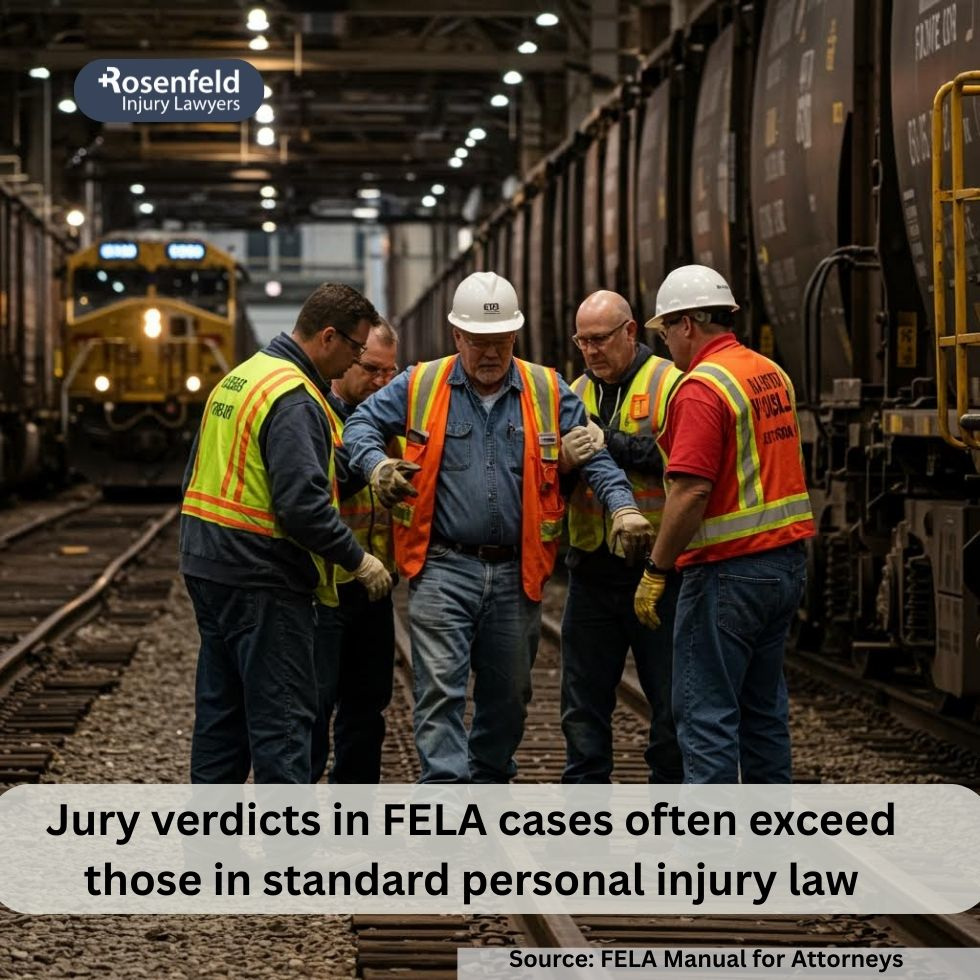
At Rosenfeld Injury Lawyers, we represent Chicago railroad workers in a wide range of FELA cases involving serious and preventable injuries.
If you’ve experienced an on-the-job injury in any of these situations, we’re ready to help you pursue full and fair compensation.
Many Chicago railroad accidents are preventable and occur because of unsafe practices or equipment. Our top-rated Chicago railroad injury lawyers have seen how injuries caused by railroad work often stem from known hazards that employers fail to address. Common causes include:
Under the Federal Employers’ Liability Act, injured workers can hold their employers responsible if negligence contributed to the accident. We help injured employees prove the railroad’s negligence and fight to recover compensation.
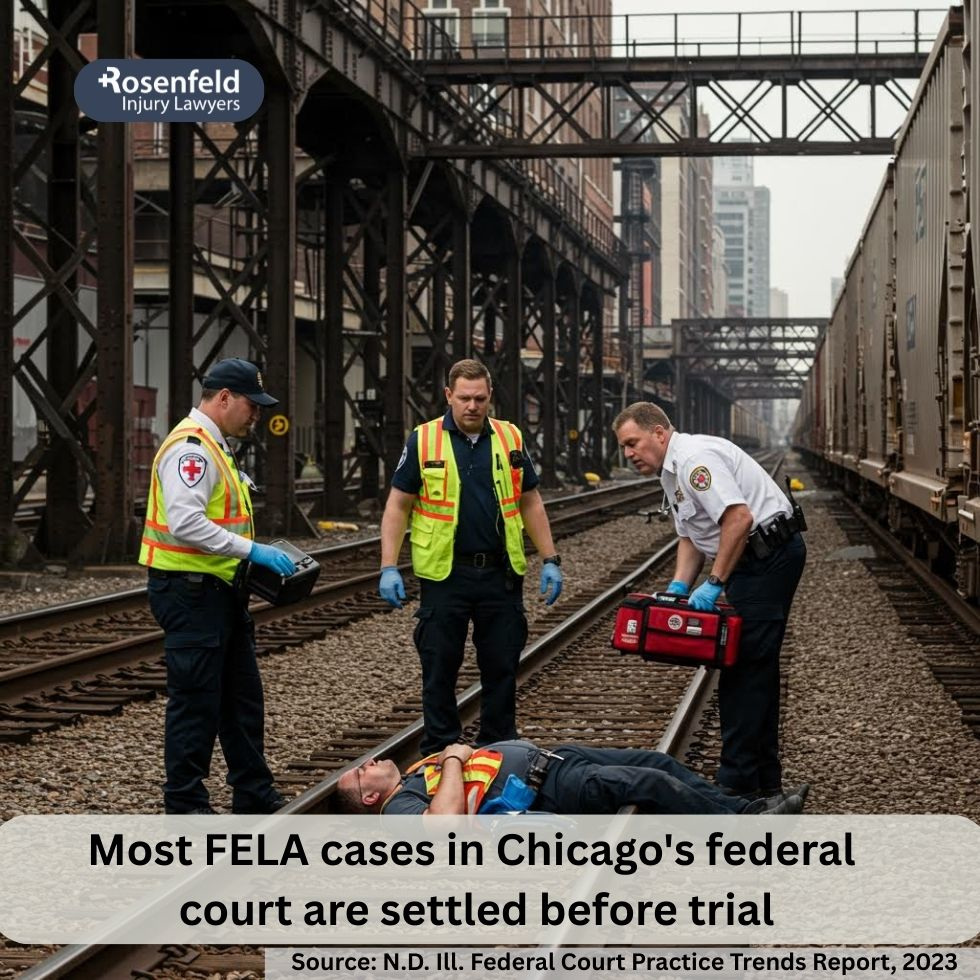
Railroad and train accidents often result in serious injuries that can change a person’s life in an instant. Our law firm regularly helps clients recover compensation for some of the most severe and life-altering harm, including:
These injuries not only require extensive treatment but often lead to permanent disability and loss of income. Under the Federal Employers’ Liability Act, injured railroad workers may be entitled to compensation when company negligence is involved.
Injured workers covered by the Federal Employers’ Liability Act (FELA) can pursue a wide range of damages when employer negligence plays a role in their injury. Unlike traditional workers’ compensation, FELA allows for recovery that more fully reflects the impact of an injury. Compensation awarded in FELA claims includes:
Every FELA case is different, but our goal is always to help you recover the maximum compensation allowed under federal law after a railroad injury.
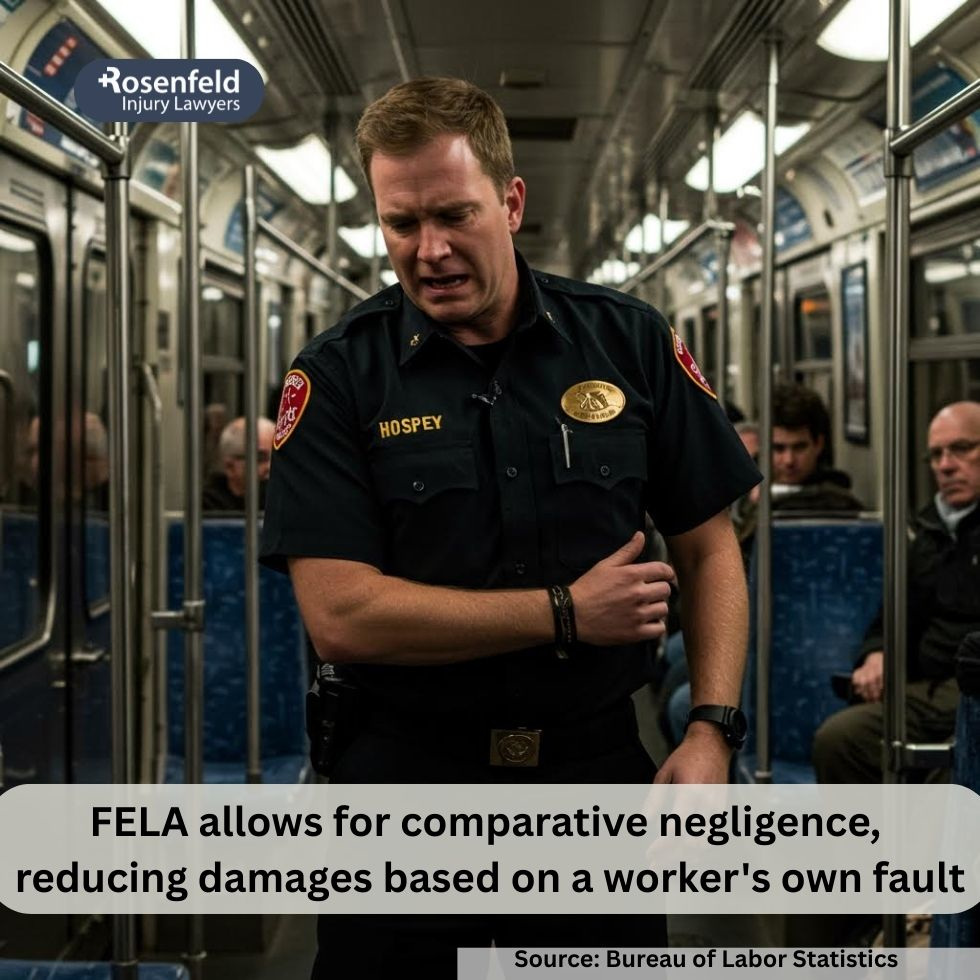
According to Law.com’s VerdictSearch, the average FELA payout in Illinois is approximately $749,333, with most case values falling between $270,000 and $2,500,000. The median award is about $330,667, and Cook County is listed as the most common venue for these cases.
These numbers provide a general idea of potential compensation, but it’s essential to understand that the value of a FELA claim depends on several key factors, including:
An experienced Chicago railroad accident lawyer can evaluate these factors and help you build a strong case for full and fair compensation under the Federal Employers’ Liability Act.
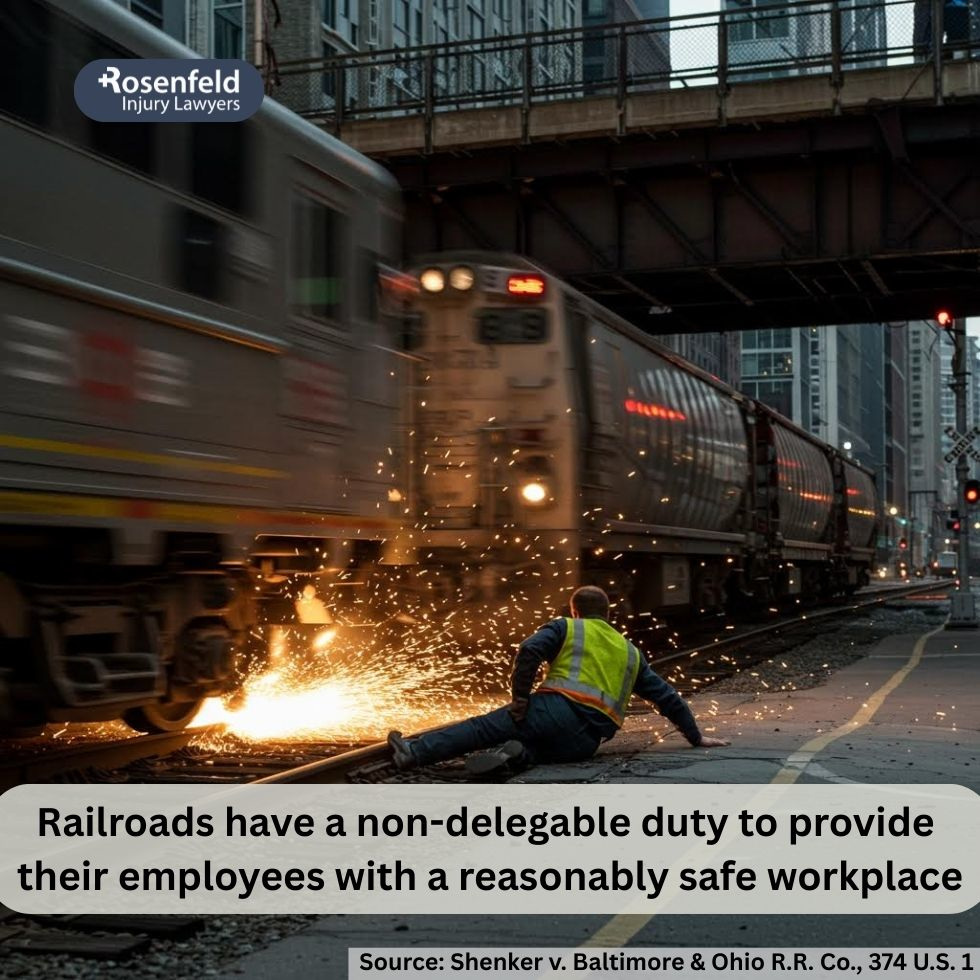
$2,500,000 Verdict for Amtrak Conductor Injured by Ice
William Poole, an Amtrak conductor, slipped and fell on ice in a locomotive compressor room while inspecting a train at Chicago’s Union Station. He alleged that Amtrak failed to remove ice, violated safety protocols, and breached both the Federal Employers’ Liability Act (FELA) and the Locomotive Inspection Act. After partial summary judgment was granted on liability, a jury awarded Poole $2.5 million for hip, leg, back, and knee injuries, including pain, suffering, disability, medical expenses, and lost income.
$371,000 Verdict for Track Worker with Back Injury
Ed Wegman, a 45-year-old track worker for Consolidated Rail Corp., claimed he aggravated a preexisting spinal condition while lifting heavy welding supply boxes without proper equipment. He underwent conservative care followed by spinal fusion surgery and was unable to return to railroad work. The railroad argued he was not required to lift the boxes and had failed to disclose his back issues. The jury awarded $742,000, reduced to $371,000 due to Wegman’s 50% comparative fault.
$330,657 Verdict for Metra Conductor Who Fell Into Platform Gap
Metra conductor Patrick Walsh fell into a gap between the train and platform at the Libertyville station, suffering a torn Achilles tendon and other injuries. He claimed the track curve violated internal Metra design policies, making the station unsafe under FELA. The defense argued the curve met industry standards and Walsh knew of the hazard. A jury awarded $330,657 for lost income, pain, and disability, which was later reduced to $247,992 after assigning him 25% comparative negligence.
$275,000 Verdict for CSX Conductor Thrown in Yard Collision
Nathan Johnson, a conductor for CSX Transportation, was working in a Chicago rail yard when a string of cars struck his locomotive. He was thrown backward and later diagnosed with a herniated disc at L5-S1. He claimed CSX failed to provide a safe work environment and violated FELA. CSX denied responsibility, citing possible third-party factors and failure to mitigate damages. A jury awarded Johnson $275,000 for lost earnings, disability, and pain and suffering.
$270,000 Settlement for Amtrak Attendant Injured Carrying Luggage
Joyce Junior, a 62-year-old Amtrak attendant, injured her back while carrying a passenger’s heavy suitcase down a flight of stairs during an unscheduled stop. She claimed she was directed to perform work outside her job description, including lifting baggage, violating safety expectations under FELA. Amtrak contested the extent of her injuries and denied wrongdoing. Junior was diagnosed with a lumbar disc injury and treated conservatively. The parties reached a pretrial FELA settlement of $270,000.
Hiring an experienced railroad injury attorney is critical if you’re an injured railroad worker seeking fair compensation. Unlike traditional workers’ compensation claims, a FELA requires a higher burden of proof that the company’s negligence contributed to your injury. This can involve unsafe working conditions, defective equipment, or a failure to follow safety protocols.
Railroad companies and their insurance teams are well-prepared to challenge these claims. They often argue the worker was partially responsible or that the injury wasn’t caused on the job.
Our Chicago railroad injury lawyers have decades of experience handling railroad injury litigation, including cases involving severe injuries, permanent disability, and fatality. We understand the tactics railroads use and how to counter them effectively. With our firm, you’ll have experienced legal help to pursue the compensation you deserve under the Federal Employers’ Liability Act.
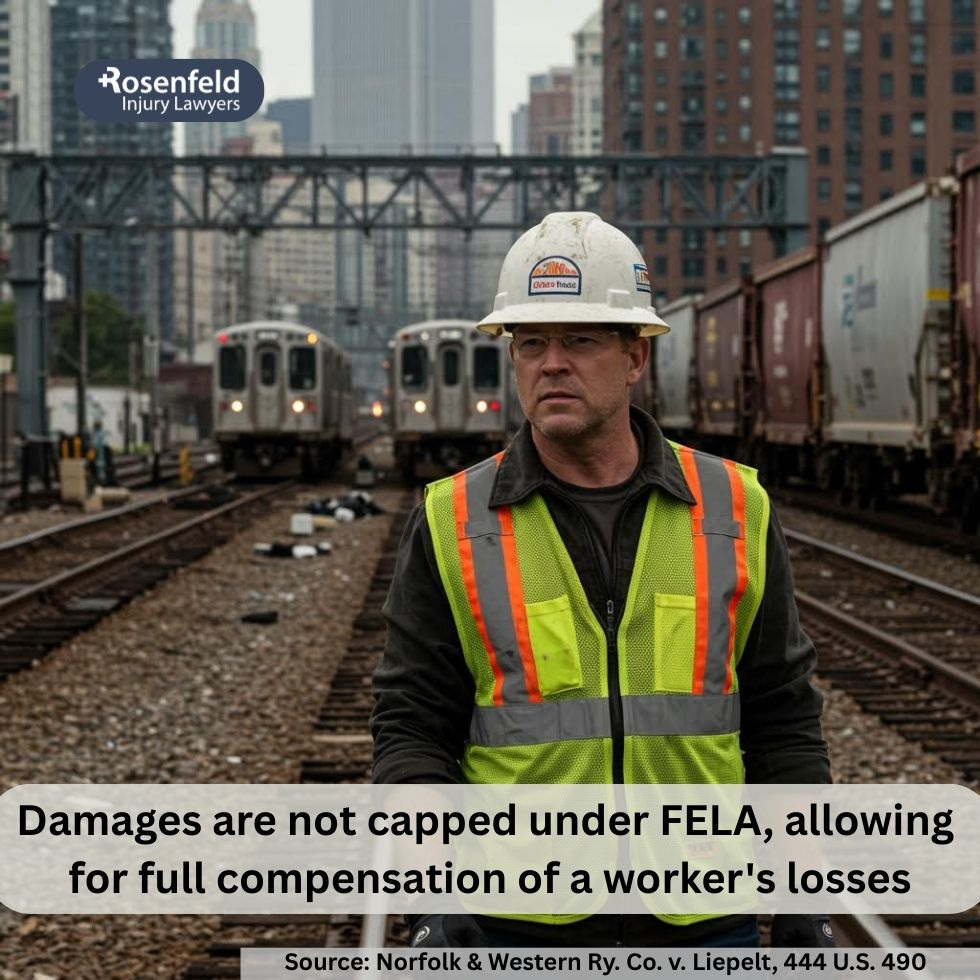
In 2024, there were 3,494 injuries and occupational illnesses involving railroad employees across the U.S., according to data from the National Safety Council. While that number is down from earlier years, it highlights that railroad work remains dangerous—even with improved safety protocols. Tragically, eight railroad workers died in work-related incidents that same year.
In comparison to passengers or other non-trespassers, injured railroad workers face a unique set of risks tied directly to their job duties, often involving heavy machinery, unsafe working conditions, or negligence. These risks make legal protections under FELA essential.
In Chicago, many railroad worker injuries happen at high-traffic rail facilities and yards where heavy equipment, tight schedules, and constant movement increase the risk of accidents. Some of the most common locations include:
Each of these sites presents unique risks, and when railroad company negligence leads to injury, workers have the right to file a claim under the Federal Employers’ Liability Act. Our Chicago railroad worker injury attorneys are familiar with these environments and the dangers they pose.
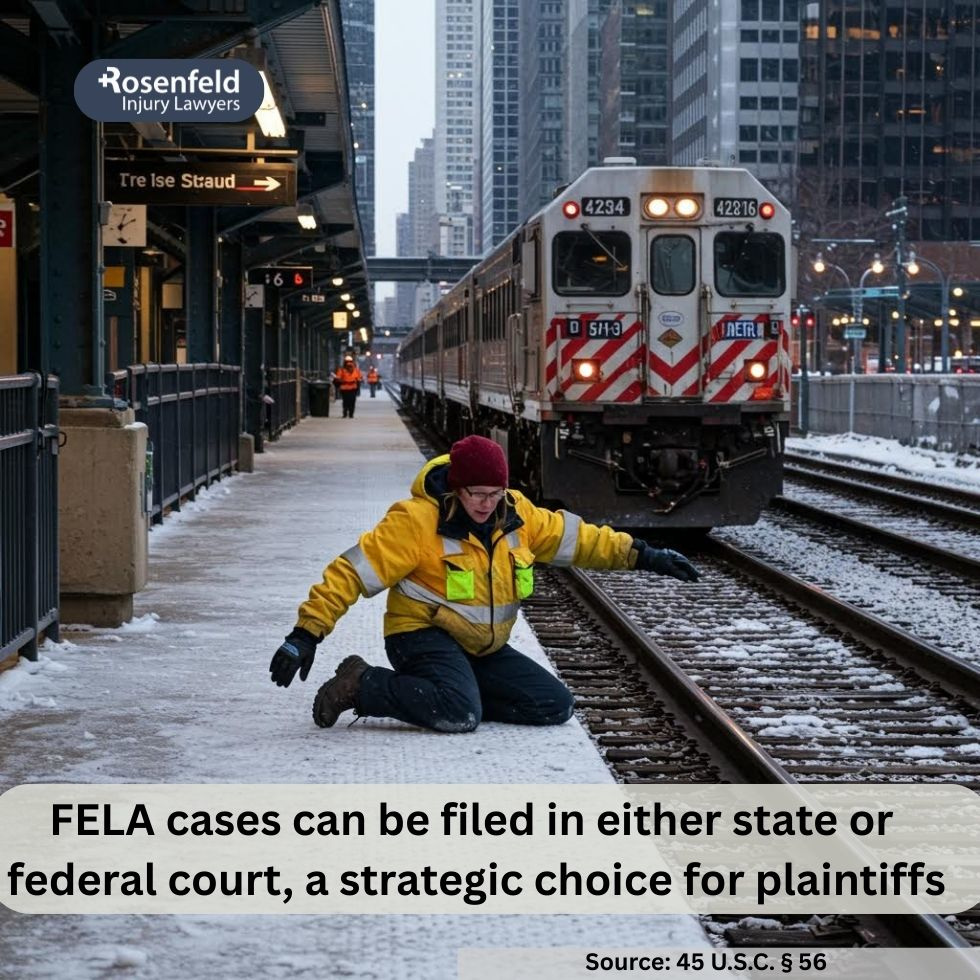
The Federal Employers’ Liability Act (45 U.S.C. §§ 51-60) governs injury claims for railroad workers employed by federal employers. It allows injured employees to sue for full and fair compensation when negligent employers contribute to an injury. FELA overrides state law and applies in both federal and state courts.
In the case of Consolidated Rail Corp. v. Gottshall, 512 U.S. 532 (1994), the U.S. Supreme Court confirmed that FELA requires a higher burden of proof of employer negligence. It also clarified the limits of emotional distress claims under FELA. This case set the standard of liability in many modern railroad injury lawsuits.
Chapter 9-28 of Chicago’s Municipal Code governs railroad crossing safety in the city, requiring warning systems and proper maintenance. Failures such as unprotected railroad crossings may support FELA claims, especially when a railroad injury occurs at or near a crossing due to a lack of safeguards or compliance violations.
For individuals not eligible for FELA coverage, the Illinois Joint Tortfeasor Contribution Act (740 ILCS 100/) allows damages to be shared among multiple at-fault parties. It’s often used in cases involving non-railroad employees injured due to company negligence or defective third-party equipment.
Illinois’ Premises Liability Act (740 ILCS 130/) protects visitors injured due to unsafe conditions on someone else’s property. While it doesn’t apply to most injured railroad employees, it may cover third parties hurt at rail yards, stations, or crossings caused by dangerous premises.
If defective tools or machinery contributed to a railroad worker injury, 735 ILCS 5/2-21 governs third-party product liability claims. While FELA focuses on employer fault, injured employees may also sue manufacturers under this statute when equipment failure played a role.
Illinois’ Vehicle Code (625 ILCS 5/) applies to railroad crossings, contractor vehicles, and traffic-related incidents involving railroad workers. For example, if a worker is struck by a truck at an unprotected railroad crossing, this code may apply alongside a FELA claim.
The key difference between a FELA claim and a standard workers’ compensation claim under the Illinois Workers’ Compensation Act (820 ILCS 305) is fault. Under FELA, an injured railroad worker must prove that the railroad’s negligence contributed to the injury. This allows for broader damages, including pain and suffering, loss of enjoyment of life, and full wage loss, not just partial benefits.
In contrast, workers’ compensation provides no-fault benefits, but limits recovery to basic medical expenses and a percentage of lost wages. It does not require proof of negligence, but also doesn’t permit lawsuits for full damages.
Since FELA applies only to railroad employees working for federal employers, it offers far greater potential compensation, provided fault can be shown. Our Chicago railroad injury lawyers can help determine which path applies to your case.
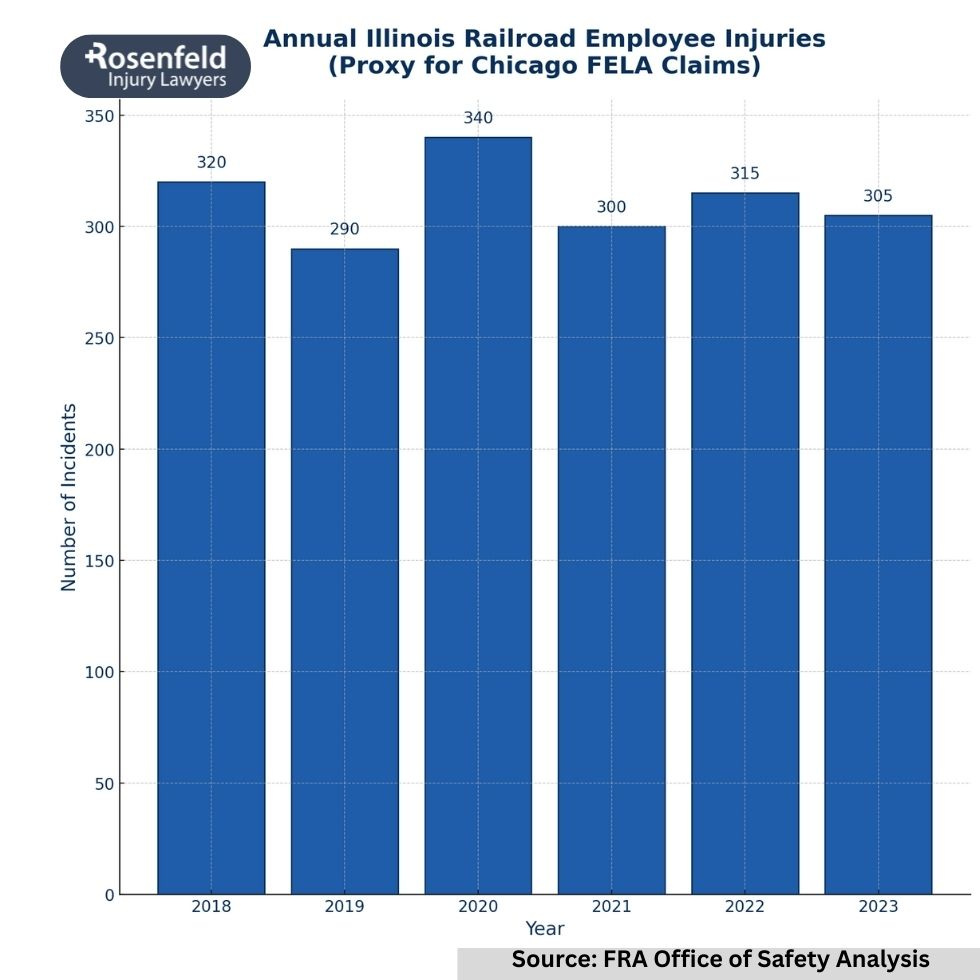
Under the Federal Employers’ Liability Act, you have three years from the date of your injury—or the date you reasonably discovered it—to file a lawsuit. Missing this deadline can bar your claim entirely, so it’s essential to speak with a Chicago railroad accident lawyer as soon as possible.
For third-party claims, 735 ILCS 5/13-202 gives you two years from the date of injury to file a personal injury lawsuit. This may apply if your injury involved defective equipment or a negligent contractor.
In railroad worker injury cases, liability often extends beyond just the railroad employer. Under the Federal Employers’ Liability Act (FELA), the primary responsibility lies with the railroad company if its negligence—such as unsafe work conditions, inadequate training, or failure to follow safety rules—contributed to the injury.
However, other parties can also be held accountable. Equipment manufacturers may be liable under product liability laws if defective tools, machinery, or railcars caused or worsened the injury. In some cases, contractors or maintenance companies working in the yard or on the tracks may share fault for unsafe conditions.
A thorough investigation can determine whether multiple parties are responsible. If so, claims may be pursued under both FELA and state laws, such as the Illinois Joint Tortfeasor Contribution Act, to ensure the injured railroad worker receives full compensation.
Railroad companies and their insurers often use aggressive defenses to limit or deny FELA claims. One of the most common is comparative negligence, where the company argues that the injured railroad worker was partially or entirely responsible for the accident. While FELA allows for reduced compensation if the worker shares fault, it does not bar recovery; our team works to minimize any blame placed on you.
Another frequent defense is alleged employee misconduct. Railroads may claim the injury occurred because the worker failed to follow proper procedures or acted recklessly. We counter this by gathering evidence of poor training, lack of supervision, or unsafe practices tolerated by the employer.
Railroads may also deny control over the worksite, especially if contractors or third parties are involved. Our attorneys push back by showing the railroad maintained authority over operations, staffing, or safety policies, even when outside parties were on site.
As top-rated Chicago railroad injury attorneys, we anticipate these defenses early. We build strong cases using expert testimony, safety records, and internal company documents to prove negligence and recover compensation for our clients.
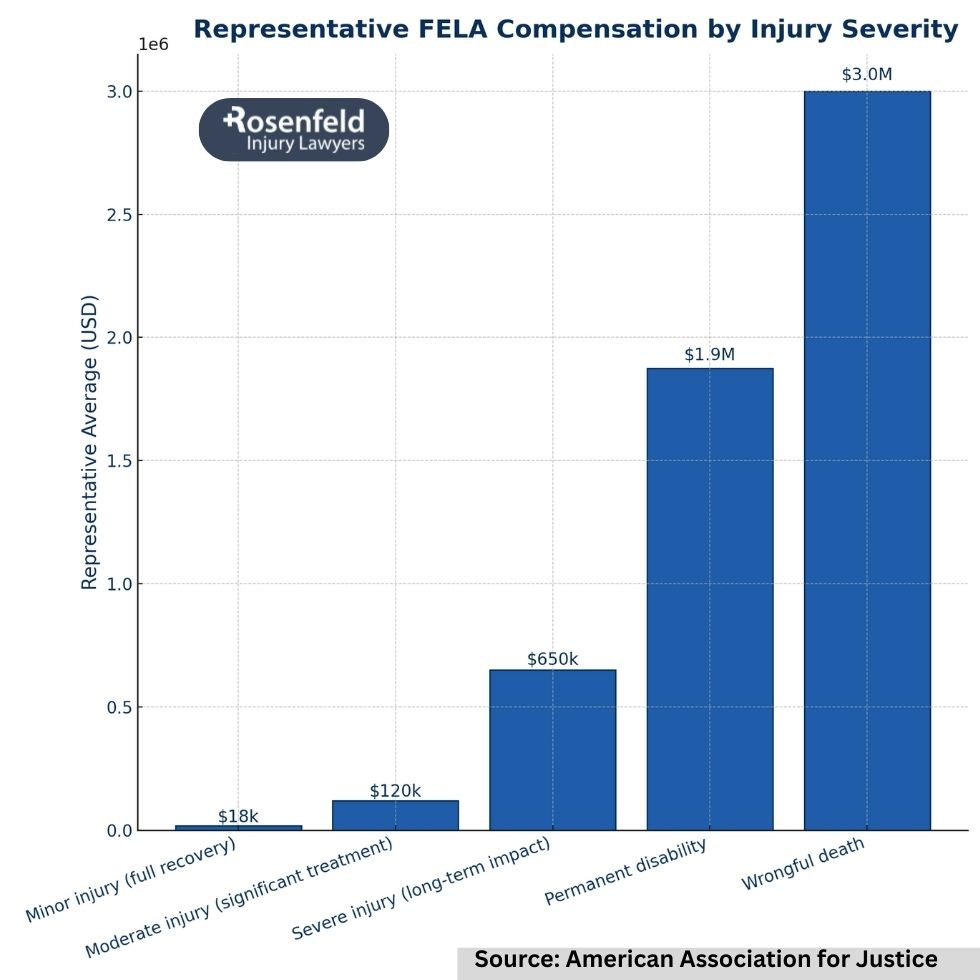
To strengthen your FELA claim as an injured railroad worker in Chicago, it’s essential to act quickly and document everything. First, seek immediate medical attention. This not only protects your health but also creates a record of the injury. Be sure to report the incident in writing to your supervisor or safety officer, and keep a copy for yourself.
If anyone saw the accident, gather witness statements while their memories are fresh. These accounts can support your version of events and help establish negligence. If defective equipment or unsafe conditions played a role, take photos and preserve any physical evidence before it’s removed or repaired.
The stronger your documentation, the harder it is for the company to dispute your claim. Your designated legal counsel can use this evidence to recover compensation.
A skilled Chicago railroad accident lawyer plays a key role in helping injured railroad workers build a strong case under the Federal Employers’ Liability Act (FELA). One of the first steps is investigating negligence, whether it involves unsafe equipment, poor training, lack of supervision, or violations of safety regulations. This includes gathering internal records, maintenance logs, and witness statements to help prove fault.
We also work closely with medical and vocational experts to understand the full impact of your injuries. This includes all medical expenses related to the injury, limitations on your ability to work, and the need for future care or job retraining. These assessments are key to valuing your case accurately.
If the company refuses to offer fair compensation, our attorneys are fully prepared to take your FELA case to trial. We don’t settle for less than what our clients need to recover and rebuild.
Jobs with high physical demands or constant exposure to heavy equipment tend to carry the most risk. These include locomotive engineers, conductors, brakemen, yardmasters, signal maintainers, and track laborers. Workers in rail yards and on moving trains often face hazards like slip-and-falls, collisions, exposure to toxic materials, and crush injuries. Even seemingly routine tasks can lead to serious or cumulative trauma injuries if safety standards aren’t followed. If you’re in any of these roles and suffered an on-the-job injury, you may have a valid FELA claim.
Unlike workers’ compensation, FELA requires injured railroad workers to show that the company’s negligence played some role in causing the injury. The good news is that the standard of proof under FELA is lower than in most personal injury cases, and you don’t have to prove the railroad was entirely or even partially responsible. Even showing that the employer’s actions or unsafe conditions contributed in part to the accident is enough to recover compensation. Our firm gathers evidence to clearly establish this connection and strengthen your claim.
Under FELA, a worker can still recover damages even if they were partially responsible for the accident. The law follows a modified comparative negligence rule, meaning your compensation is reduced by the percentage of fault assigned to you. For example, if you’re found 30% at fault and awarded $100,000, you would receive $70,000. As long as you’re not 100% responsible, you still have the right to recover. Our Chicago railroad worker injury lawyers are skilled at pushing back against exaggerated claims of worker fault.
To support a FELA claim, you need clear evidence showing the railroad’s negligence contributed to your injury. This may include accident reports, safety violations, witness statements, photos of unsafe conditions, and medical records linking your injury to work duties. Maintenance logs, inspection failures, or training deficiencies can also be powerful. Expert testimony—medical or occupational—often helps prove the long-term impact of the injury. Our team builds strong claims by collecting the documentation needed to support your right to compensation.
At Rosenfeld Injury Lawyers, we represent injured railroad workers on a contingency fee basis. This means you pay nothing up front. We only collect legal fees if we recover money for you through a settlement or trial. If your claim isn’t successful, you owe us nothing. We also offer a free consultation to evaluate your case, answer your questions, and explain what to expect throughout the legal process. You have nothing to lose—and potentially everything to gain—by speaking with a Chicago railroad worker injury attorney.
Yes. If a railroad worker dies due to negligence, their surviving family members may file a wrongful death claim under FELA. This allows recovery for lost financial support, funeral costs, and loss of companionship. Fatal injuries due to unsafe working conditions, equipment failures, or policy violations all fall under the scope of the Federal Employers’ Liability Act. Our firm works closely with families to pursue justice and compensation for the preventable loss of a loved one.
FELA covers occupational illnesses and cumulative trauma injuries that develop gradually. This includes conditions like back injuries from years of lifting, repetitive strain in joints, or respiratory problems from long-term chemical exposure. The time limit to file begins when you reasonably discover the injury and its connection to your job. These claims often require expert medical support and a detailed work history. If you’re experiencing pain or health problems from railroad work, a Chicago railroad injury lawyer can help determine if you have a valid case.

If you or a loved one was injured while working for a railroad company, don’t wait to protect your legal rights. The Federal Employers’ Liability Act (FELA) gives you the right to recover compensation, but proving negligence and building a strong case takes experienced legal help.
At Rosenfeld Injury Lawyers, we offer personalized representation backed by decades of success in railroad worker injury cases. We handle every FELA case on a contingency fee basis, which means you pay nothing unless we win. Whether you were hurt in a yard accident, at a railroad crossing, or due to defective equipment, we’re here to help you pursue the compensation you deserve.
Call our Chicago personal injury lawyer team at (888) 424–5757 or fill out our contact form to schedule your free consultation today.
Our downtown office, near the Richard J. Daley Center, Dirkson United States Courthouse, and the Chicago Workers’ Compensation Commission, offers convenient access from Aurora, Joliet, and Waukegan via I-90, I-94, and I-290.
225 W Wacker Dr #1660
Chicago, IL 60606
Phone: (847) 835-8895
Toll Free: (888) 424-5757
We also serve clients from Champaign, Elgin,Naperville, Springfield and throughout Illinois.
All content undergoes thorough legal review by experienced attorneys, including Jonathan Rosenfeld. With 25 years of experience in personal injury law and over 100 years of combined legal expertise within our team, we ensure that every article is legally accurate, compliant, and reflects current legal standards.